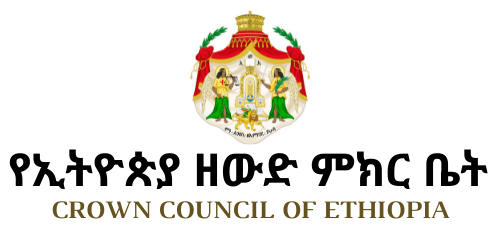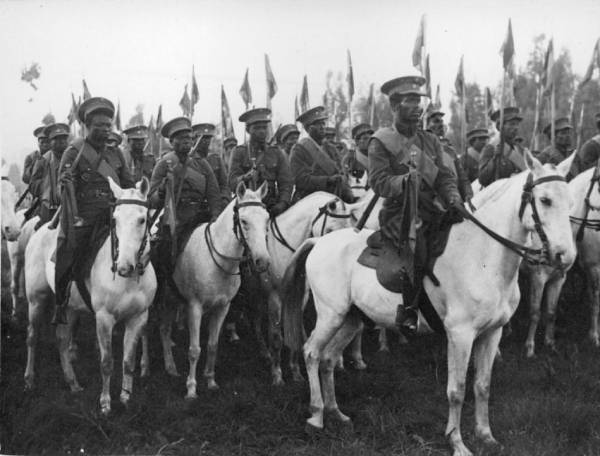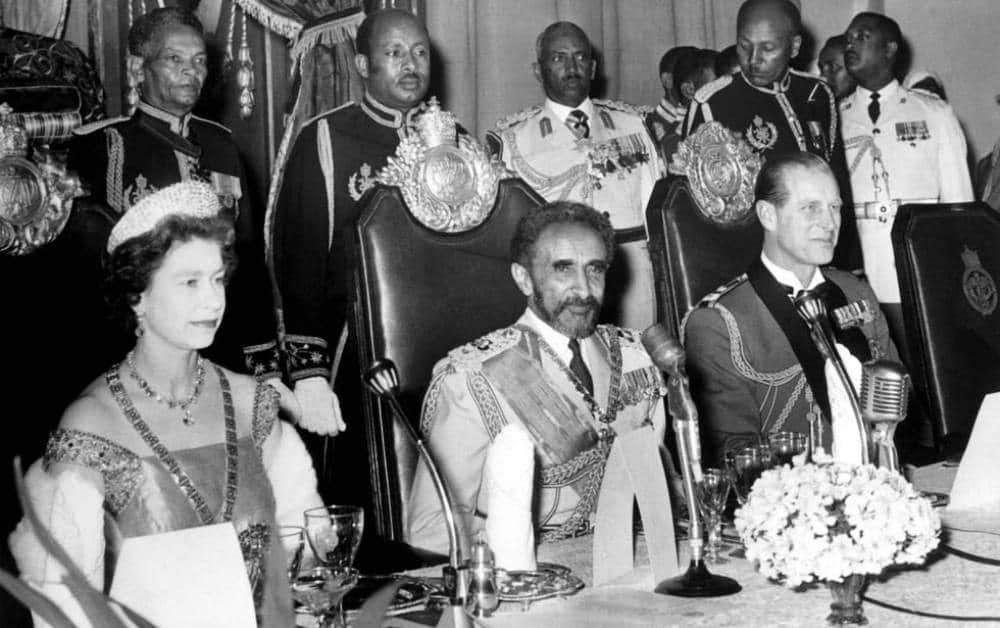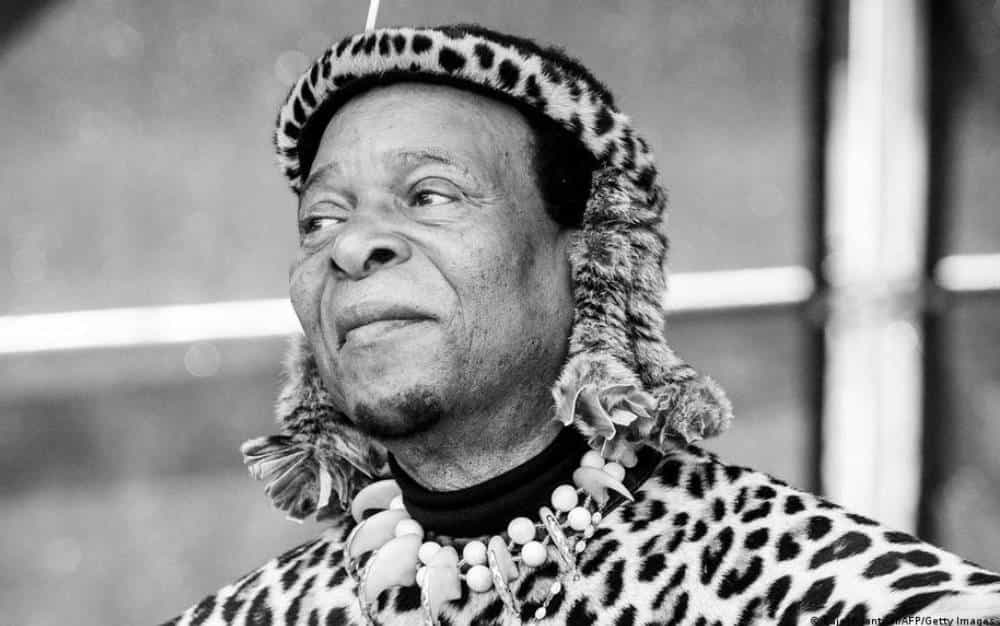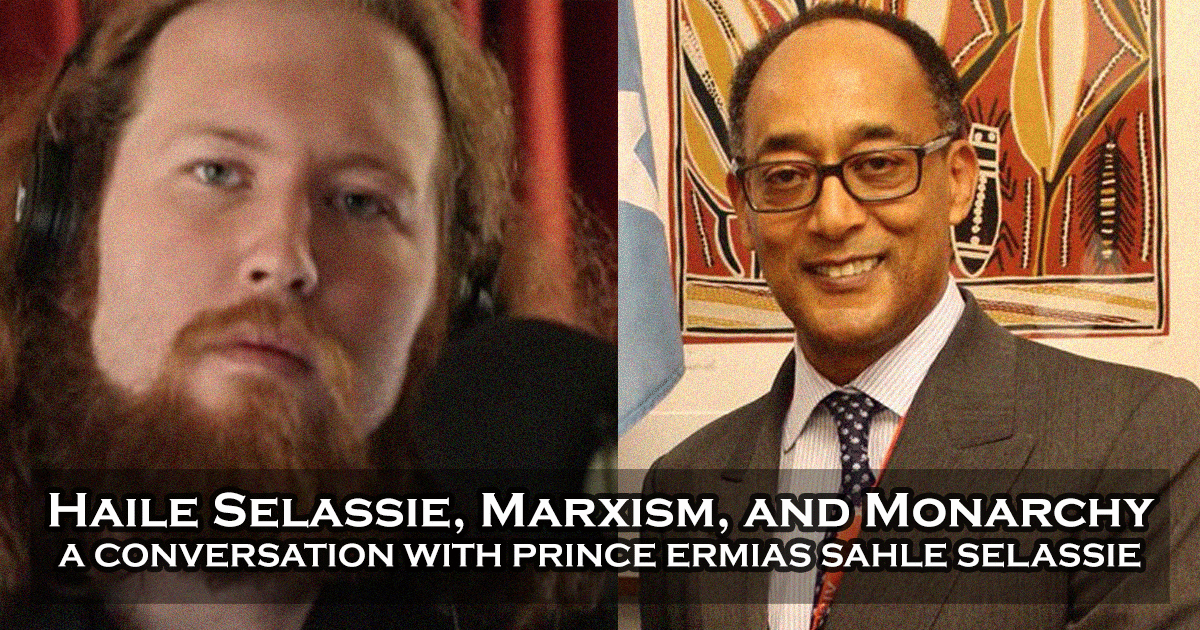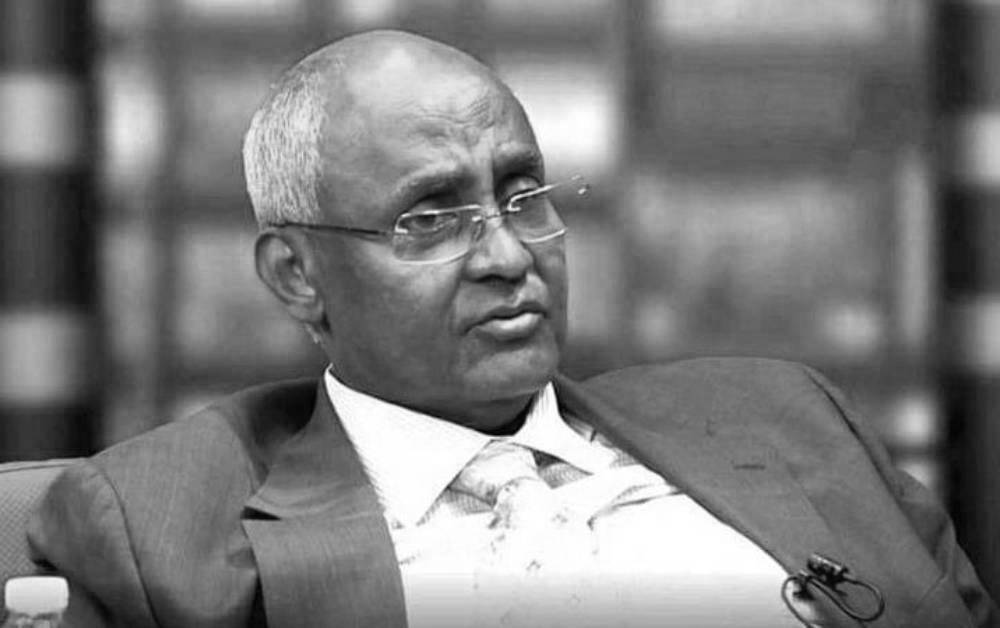David Gornoski meets with the President of the Crown Council of Ethiopia, HIH Prince Ermias Sahle-Selassie Haile-Selassie. Prince Ermias Sahle Selassie starts the discussion by commenting on the civil unrest that is currently brewing in Ethiopia and what lies at the heart of the conflict. He also comments on Ethiopia’s vanishing Christian heritage; the end of the Solomonic dynasty; the Prince’s last memories of Emperor Haile Selassie; challenges faced by modern-day Africa; the resurgence of Identity Politics in America; Black Lives Matter and African folk religion; and more.
Victory Day Statement 2013/2021
A Statement by His Imperial Highness Prince Ermias Sahle-Selassie Haile-Selassie, President of the Crown Council of Ethiopia
Religious Leaders, Members of the Ethiopian Government, Ethiopian Patriots and the People of Ethiopia:
It gives me heartfelt pleasure to celebrate Ethiopia’s 80th Victory Day Anniversary. Ethiopia’s victory over invading fascist Italian forces eighty years ago could not have been possible without the sacrifices paid by our gallant Patriots and the diplomatic struggle waged by my grandfather, Emperor Haile Selassie I, to liberate Ethiopia on the international stage. We celebrate this day and pay tribute to our ancestors for the sacrifices they made to assure the territorial integrity, independence, and unity of our people.
Every year, The Crown Council of Ethiopia celebrates Victory Day and commemorates our Patriots. What makes this year’s celebration different for the Crown Council is our ability to celebrate Victory Day with our beloved people in Ethiopia and in other parts of the world through the use of modern technology.
There are many lessons we can learn from our history. We should always remember and be cognizant of the fact that our mothers and fathers galvanized under one national flag and sacrificed their sacred lives to ensure that our people would live in peace, love, freedom, dignity, and honour.Our ancestors relished in victory because they did not divide along ethnic or religious lines. If we are to properly celebrate Victory Day, and follow in the footsteps of our mothers and fathers, then we must commit to living in harmony, respecting and loving one another.
I thank the organizers on behalf of our Crown Council for their wisdom and foresight in using this very important holiday to bring us together to celebrate in unity.
Happy 80th Victory Day!
May God bless and protect Ethiopia and her people!
The Passing of a Great Friend of Ethiopia, HRH Prince Philip, The Duke of Edinburgh
A Statement by His Imperial Highness Prince Ermias Sahle-Selassie Haile-Selassie, President of the Crown Council of Ethiopia
The Ethiopian People lost a great friend with the passing on April 9, 2021, of His Royal Highness Prince Philip, Duke of Edinburgh. We deeply mourn his departure and honour his great achievements while extending deepest sympathies to Her Majesty, Queen Elizabeth II, of the United Kingdom and the Commonwealth of Nations, for the loss of her beloved husband.
We share with the entire Royal Family and the Commonwealth the grief at the loss of the Queen Elizabeth’s consort, and we mourn the passing of a great friend of Ethiopia in Prince Philip. Among other things, he fought to protect the wildlife of our country.
But we remember him, as well, as a great figure who saw heroic service in World War II, and subsequently, with Her Majesty Queen Elizabeth, built a great friendship with Ethiopia and with Emperor Haile Selassie I. We may think of Prince Philip particularly in light of the fact that he bridged the period of the great World War II alliance of the United Kingdom and the Commonwealth with Ethiopia, bringing about the first Allied Victory of that war. The Victory of the Battle of Gondar in November 1941 saw Axis forces driven for the first time from foreign lands they had occupied illegally.
I was privileged to have met on occasion with HRH Prince Philip, and valued his counsel.
God Bless the memory of Prince Philip, Duke of Edinburgh, and may we always think of him as a great friend of Ethiopia. God Bless, at this particular time, Her Majesty Queen Elizabeth and her family, and the People of the great Commonwealth who Prince Philip served. And God Bless Ethiopia
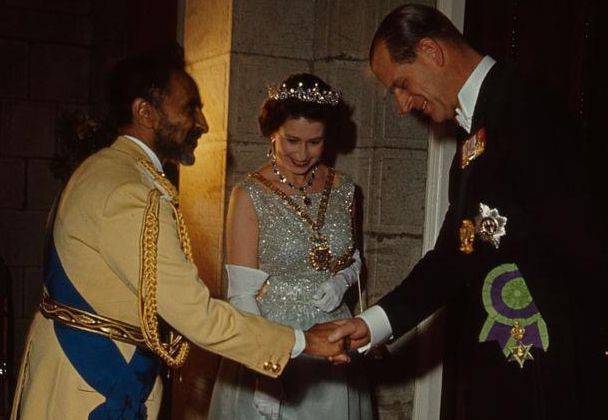
His Imperial Majesty Emperor Haile Selassie I greeting His Royal Highness the Prince Philip, Duke of Edinburgh, during Her Majesty Queen Elizabeth II’s State Visit to Ethiopia in 1965. Prince Philip is seen wearing the Grand Cross of the Order of the Queen of Sheba, while Her Majesty, in the background, is shown wearing Ethiopia’s premier honour, bestowed on regnant sovereigns, the Collar of the Order of Solomon 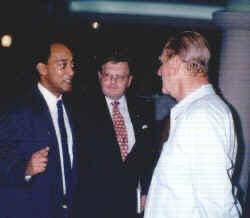
HRH Prince Philip in conversation with His Imperial Highness Prince Ermias Sahle-Selassie Haile-Selassie and Ethiopian Crown Council Strategic Advisor Gregory Copley (center), in Barbados.
On the Passing of His Majesty King Goodwill Zwelithini kaBhekuzulu of the Zulus
A Statement by His Imperial Highness Prince Ermias Sahle-Selassie Haile-Selassie, President of the Crown Council of Ethiopia
It was with profound sadness that we learned that His Majesty King Goodwill Zwele-thini is no longer with us.
His ukukhothama — his “kneeling”; that is, his move to allow his successor to rise, for the King has gone to be with his ancestors and remains as an inspiration to those left behind — symbolised the end of a great era. He reigned for a half-century, wisely and with great skill. He saved and rebuilt the Zulu nation, and he had mapped a path of dignity and sovereignty for his People.
His Majesty was kind to receive me and give me advice and introductions in Southern Africa.
The King was a great force for peace in Africa. He was a calming and wise influence. And yet he was fearless in protecting the dignity and in restoring the historical territories and rights of the Zulu people. His long tenure on the Throne means that he will be difficult to replace, but will always remain an influence for good on the Zulu people, just has his ancestor, King Cetshwayo kaMpande, was. And he will be an inspiration always to them, as was King Shaka kaSenzangakhona.
God Bless the Memory of King Goodwill Zwelithini. God Bless the Zulu People, and guide them as they embrace a new King.
And God Bless Ethiopia.
125 Years After the Beacon of Ethiopian Unity Was Lit
A Statement by His Imperial Highness Prince Ermias Sahle-Selassie Haile-Selassie, President of the Crown Council of Ethiopia
On the 125th Anniversary of the Victory of Adwa
It is 125 years since the People of Ethiopia gathered in unity under the rallying call of Emperor Menelik II to repel the foreign army which had invaded our homeland.
The Victory of the Battle of Adwa on 23 የካቲት 1888 (March 1, 1896, in the Western calendar) by the combined Ethiopian forces — who volunteered from around the Empire — lit a beacon of freedom and dignity which has inspired Africa and commanded the respect of the world ever since.
Adwa reflected the selfless courage of peoples from across the Empire who saw the cause of their collective Ethiopianness as something which enhanced their ability to defend their sovereignty and ability to forge their own destiny. Petty rivalries were put aside; there was mutual respect for the abilities and contributions among all the participants. And we saw what we could achieve when we acted together. Each Ethi-opian honoured the other.
Ethiopians are clearly pleased that the Government of Ethiopia has formally instituted recognition of this historic event.
The Crown Council marks this as the beginning of a full year of its celebration of the 125th anniversary of the Victory of Adwa, until 22 የካቲት 2014 (March 1, 2021), dur-ing which — as COVID-19 restrictions on travel and gathering permit — it will cele-brate the Victory and the cause of the unity of all members of the Ethiopian family.
God Bless Ethiopia. God Bless the Memory of Emperors Menelik II and Haile Selassie I.
Our Beloved Country, Ethiopia – Where do we go from here?
A Statement by His Imperial Highness Prince Ermias Sahle-Selassie Haile-Selassie, President of the Crown Council of Ethiopia
On behalf of the Crown Council of Ethiopia, I extend my deepest and heartfelt condolences to all the families who, because of the violence of recent days in our homeland, have had to bury their relatives and loved ones. We grieve with those who must continue mourning as the brutal murderers have yet to be arrested. We are disheartened to know so many innocent lives are being taken and our beloved country has now declared war with itself.
We have read, seen, and heard the cries of our people who have been targeted for their ethnic identity and religion; for being Amhara, Oromo, Tigrayan, Wolayta, Afar, or any other ethnic group has been Ethiopia’s cultural magnificence. Identifying as Christian Orthodox, Catholic, Pentecostal, Muslim, or Animist is what makes Ethiopia’s historical majesty. Many seem to have forgotten our history, as Ethiopia was the country which preserved Islam with pride and dignity. The First Hijrah was the first migration of Prophet Muhammed followers as they fled from the persecution and took refuge in the Christian Kingdom of Aksum, today’s Ethiopia and Eritrea.
It is important to remember that Ethiopia was also formed on the communal harmony of nations striving together to protect their combined territory and peoples, all the while toiling to develop a diverse society, greater with each generation of Ethiopians.
We often refer to the great Battle of Adwa as the African Victory. This is because history was never gracious to Africa, and Ethiopia was the only country able to fight its enemies and gain victory. Adwa was a reminder of the power of solidarity and unity. Remembering Atse Menelik’s vision to bring warriors such as Ras Alula, Ras Darge Sahle Selassie, Ras Tekle Haymanot, Ras Mikael, Fitawrari Habte Giorgis Dinagde, Ras Yohannas Mengesha; with Dejeazmach Balcha Aba Nefso by his side to win a war. It was a war which was a testimony to the leadership by all in this noble endeavor. These dignified leaders from the many great Peoples of Ethiopia saw the importance of unity. They did not dwell on their separate ethnicities or religious beliefs. The vision of each was one of a collective freedom and the agreement to have one overarching government body to preserve territorial diversity, dignity, and union.
Interview of HIH Prince Ermias Sahle Selassie Haile Selassie, President of the Crown Council
Sultan Hanfareh Ali Mira, 1946-2020
On behalf of the Crown Council, it is with deep sadness that we learnt of the passing of Sultan Hafareh (Humphrey) Ali Mira. We join his family and all the Afar people, as well as all those who love the Afar people in Ethiopia and worldwide, in mourning his passing. May God rest his soul and comfort his people and family in these difficult times.
The Sultan, who was enthroned in 2011, was a quiet man whose courage, intelligence, and foresight won him many admirers around the world. His courageous fight alongside his father against the Derg in Ethiopia is much admired, and proved to be on the correct side of history. It was against all odds that he chose to fight the Derg, but his principled stand, along with his father, will always be remembered in Ethiopian history.
The Sultan did not rest after this victory. He wanted to serve his people in the post-Derg Ethiopia, and to that end he worked selflessly to bring his people new freedoms and development. The Sultan was a perceptive man who could not stand by and watch as his people as they began to suffer again under a yet another corrupt dictatorship. He was always on the side of his people and the larger Ethiopian family. He was fortunate to witness the beginnings of reform and greater freedoms for the Ethiopian people yet again.
May his memory be an inspiration and continuance guidance for his people and Ethiopia.
God bless his soul.
HRH Princess Zuriash Gebre-Egsiabher, 1930-2020
It is with great sadness that we share the passing in London this month of our be-loved cousin, Her Royal Highness Prin-cess Zuriash Gebre-Egsiabher.
Princess Zuriash was a granddaughter of Empress Menen. She was married for thir-ty eight years to Prince Asrate Kassa. The Princess was a joyful and vivacious per-sonality who had a full life, enjoying both God’s grace and the tests of life. The Prin-cess was a dutiful wife and mother who also served alongside her husband in the various administrative roles he had under the Imperial Government, including as Viceroy of Eritrea.
Princess Zuriash, pictured here with Prince Asrate Kassa, was to suffer impris-onment without charge like most of her relatives for thirteen years under the brutal military dictatorship of the Derg. Her husband, Prince Asrate Kassa, was also exe-cuted without any charge by the military junta, along with sixty high ranking offi-cials of the Imperial Government.
The Princess was devout and resilient. Her difficult journey in life, especially dur-ing the darkest times, did not shadow her faith or love. She was blessed to see many grandchildren.
We pray that God comforts her children and grandchildren, and may the Almighty receive her soul so that she may Rest In Peace.
Reconciliation, and the Restoration of Prosperity, Equality, and Hope
A Statement from the Crown Council of Ethiopia by its President, His Imperial Highness Prince Ermias Sahle-Selassie Haile-Selassie
On behalf of the Crown Council, I extend my sincere and deepest condolences to the family of Mr. Hachalu Hundessa, a revered singer in Ethiopia. Mr. Hundessa has graced Ethiopia with his music, demonstrated is love for his Oromo culture and continuously challenged us to evaluate the value of unity. His senseless killing has profoundly affected people in Ethiopia and in the Diaspora.
At a time when the entire world is dealing with turmoil stemming from social dysfunctions in addition to the global health crisis which has shaken economies and developmental efforts for the wellbeing of nations, we now have to mourn the death of another courageous man. Hate crimes have erupted in all societies, benefiting only the forces of destruction and instilling fear as well as instabilities.
It is time for us to reconcile our differences. It is our moment in history for each of us to become a voice of reason to the unreasonable, and work towards fulfilling the hopes of our forefathers and mothers to develop Ethiopia and address the challenges of the youth.
Revisionism is a dangerous approach. Our youth have not benefited from historical education which not only would have highlighted how Ethiopia’s resisted foreign attempts to conquer our society, and how she showed her strength as a unified country to lead Africa and set an example to the world. Ethiopia’s greatness was never based on ethnicity. It has always been about the spirit our family of nations embodies; the culture it embraces and traditions it celebrates.
On June 30, 2020 (23 ሰኔ 2012), the destruction in Cannizaro Park, Wimbledon, in London, of His Imperial Majesty Emperor Haile Selassie I’s iconic statue, and the tearing down of the statue of the Emperor’s father — and a great 19th Century Ethiopian leader in his own right — Ras Makonnen, in Harar, confirms the concerns of our ancestors.
Ethiopians at home and in the Diaspora have witnessed an eruption of racism and ideological hatred against our own heritage with the wanton and deliberate destruction of statues of two historical figures who gave hope, prosperity, and unity to all Ethiopians. Have we forgotten that Oromo pioneers such as Taddasaa Biru, Jaagamaa Keello, Waqejira Serda, Dawit Abdi and Major Qadida Guremeysa all stood on the side of the Emperor and remained politically involved with him throughout their life?
When, on June 29, 2020, radical Oromo separatists utilized the tragic murder of the famous Oromo singer, Mr. Hachalu Hundessa, it affirmed the disruptors’ aim of halting our peaceful progress as well as dismantling the Prime Minister Abiy’s Government efforts. The destruction of these statues seeks only the demise of our diversity and demonstrates blind hatred. In pursuit of a divisive political and ethnocentric agenda, our aggressors are working tirelessly to stifle our interwoven strength and break our long-standing foundation.
The murder of Mr. Hachalu Hundessa, who had the right to speak freely and stand for his rights, has sparked greater violence, with the deaths of more than 100 people in subsequent riots. The radicals who used the excuse of secessionism and extremist ideology to attack the symbols of Ethiopia’s unity did not honor Mr. Hundessa; they defiled him by propagating hatred. In defense of Ethiopia’s sovereignty, we should remember Ras Abebe Aregai, Defense Minster Fitawory HabteGiorgis, General Mulugeta Buli and all the countless Oromo soldiers who stood as one nation in Battles such as the Battle of Adwa as well as the Battle of Machew. Let’s preserve the pride and integrity of our unity. These ethnically-motivated secessionists, supported and financed for many years by foreign governments, have become the enemy of Oromo’s progress, not the champions of Oromo greatness.
Historians know that our great unifiers, Emperor Haile Selassie I and Ras Makonnen along with many other leaders, have been beacons of reconciliation and unity. The radicals who tore down the statues did so knowing that the great motivation of Emperor Haile Selassie was to end ethnic and regional inequality in Ethiopia. Both the Emperor and Ras Makonnen were known for elevating Oromo People as other ethnic people in the territory of Ethiopia, ensuring that they would be a vital and equal part of the greater Ethiopian dream. They brought the Oromo into the heart of the Ethiopian society, and I am living proof, as is the Prime Minister, and so many others. Destroying their legacies and aspirations for Ethiopia will not erase their grandeur.
We must be able to forgive one another for our forefathers’ perceived wrongdoing. We must be able to reconcile our differences, as our shortcomings will be the greatest hurdles for our children. The world is not the same as it was in the time of the Emperor and his Father. Many things are changing and the 21st Century will affect the fundamentals of our existence. We must all overcome this crude belligerence, and this insult to our knowledge and dignity. We are capable of progress with our ability to act as a unified family of proud cultures and peoples.
The death of Mr. Hachalu Hundessa must be addressed transparently through judicial channels, and the murderers brought to justice in open trial. I am pleading to elders, mothers and fathers, and all Ethiopians to extend your reach and to work towards forgiveness. We must march towards hope, prosperity, and dignity.
A country, with its nation at home and abroad, mourns Mr. Hundessa’s untimely death as it has awakened us to the reality of our growing pains. We hope to build forward as one nation recognizing and valuing our culture, history and traditions.
Let us stand for reconciliation and forgiveness. Let us build a foundation of hope, prosperity, and dignity for our children.
God Bless You, and God Bless Ethiopia.
